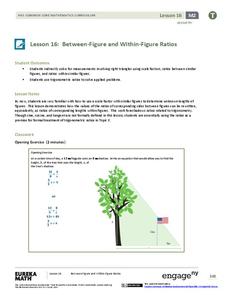EngageNY
The Unit Rate as the Scale Factor
Discover the scale factor by finding the constant of proportionality. Pupils investigate drawings to determine whether the distances are proportional. The activity defines the scale factor as the constant of proportionality, or unit...
EngageNY
Changing Scales
Pupils determine scale factors from one figure to another and the scale factor in the reverse direction. Scholars compute the percent changes between three figures.
EngageNY
The Scale Factor as a Percent for a Scale Drawing
Scholars build upon their knowledge of scale drawings by using percents to represent the scale factor. Individuals work with scaling in vertical, horizontal, and both directions.
EngageNY
Computing Actual Areas from a Scale Drawing
Square the scale factor when working with scaled drawings and area. The 19th lesson in a series of 22 introduces calculating actual areas from scale drawings. The lesson encourages pupils to use the square of the scale factor to find the...
EngageNY
Computing Actual Lengths from a Scale Drawing
Class members take scale drawings and examine scales to determine distances in the actual objects. Pupils convert the scales of different units to scale factors that can be used in proportional equations.
EngageNY
An Exercise in Changing Scales
Classmates create a scale drawing from another scale drawing, changing the scale in the process. Groups enlarge or reduce the scale of the drawing and discuss their processes.
EngageNY
An Exercise in Changing Scales 2
Reflect on altering scale factors. The last lesson in the series of 22 has the class compare the two scale drawings they created. They realize that the scale drawing becomes a scale drawing of each other. Class members continue to work...
Balanced Assessment
Scale Charts
Develop scales using tables. Pupils complete charts to show equivalent scale factors before using the completed tables to determine the sizes of scale drawings. They finish the lesson and demonstrate their understanding by completing a...
EngageNY
Relating Scale Drawings to Ratios and Rates
Enlargements and reductions are all about scale. The instructional activity introduces scale drawing to the class. Pupils determine whether the drawing is a reduction or an enlargement, and the constant of proportionality between the...
Illustrative Mathematics
Sand Under the Swing Set
Help the local elementary school fix their playground by calculating the amount of sand needed near the swing set. The problem practices setting up proportions and ratios with three different options for solving. You can chose the option...
EngageNY
Making Scale Drawings Using the Ratio Method
Is that drawn to scale? Capture the artistry of geometry using the ratio method to create dilations. Mathematicians use a center and ratio to create a scaled drawing. They then use a ruler and protractor to verify measurements.
Flipped Math
Similar Figures
Use some similar problems to find side lengths. Pupils learn the definition of similar figures and how it relates to corresponding angles and sides. Using the definition, individuals calculate the lengths of missing sides and practice...
Balanced Assessment
How Big is Big?
Now you can create your own monster movie. Learners estimate the size of a scale model monster given comparison statements and analyze these estimates to determine if the scale model accurately portrays a lizard.
EngageNY
End-of-Module Assessment Task: Grade 7 Mathematics Module 4
Asses the class to determine their knowledge of proportional relationships involving percents. Class members work through the nine-question assessment with a variety of percent problems. The multi-step problems involve simple interest,...
Balanced Assessment
House Plan
A short assessment has individuals determine the scale of a house plan. They use the scale to calculate the size of a door and window that need to be replaced, and then divide a bedroom in two, calculating the size of rooms created.
EngageNY
How Do Dilations Map Angles?
The key to understanding is making connections. Scholars explore angle dilations using properties of parallel lines. At completion, pupils prove that angles of a dilation preserve their original measure.
Curated OER
House Project
Make young mathematicians' dreams a reality with this fun drawing project. Given the task of designing their dream home, students create drawings and physical models that demonstrate their understanding of proportion and scale.
Skills Workshop
Ratio, Scale, and Proportion
Converting units is an excellent example of how math relates to our everyday tasks. The resource prompts mathematicians to use baking, cooking, and other daily activities to discover how to make larger quantities of...
Under the Dome
Sphero Draw and Drive
Determine how far the ball rolled. The class watches a video of a person controlling a sphere rolling on the floor. Pupils develop some questions about the video and make estimates to the solutions of the questions. The teacher provides...
EngageNY
Between-Figure and Within-Figure Ratios
Tie the unit together and see concepts click in your young mathematicians' minds. Scholars apply the properties of similar triangles to find heights of objects. They concentrate on the proportions built with known measures and solve to...
Noyce Foundation
Which is Bigger?
To take the longest path, go around—or was that go over? Class members measure scale drawings of a cylindrical vase to find the height and diameter. They calculate the actual height and circumference and determine which is larger.
PBS
Human Tree: Ratios
Create a personal tree. By visiting an exhibit at the National Museum of Mathematics, the resource introduces the idea of fractals. The exhibit takes an image of the person and creates a tree by repeating scaled images on the shoulders...
Illustrative Mathematics
Cooking with the Whole Cup
Whoops! Travis accidentally put too much butter into the recipe. Your bakers must find out how to alter the recipe to accommodate different changes by using unit rates and ratios . The activity has multiple parts and calculations with...
Noyce Foundation
Photographs
Scaling needs to be picture perfect. Pupils use proportional reasoning to find the missing dimension of a photo. Class members determine the sizes of paper needed for two configurations of pictures in the short assessment task.























